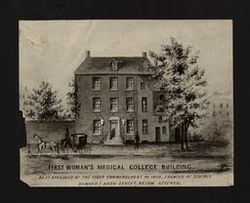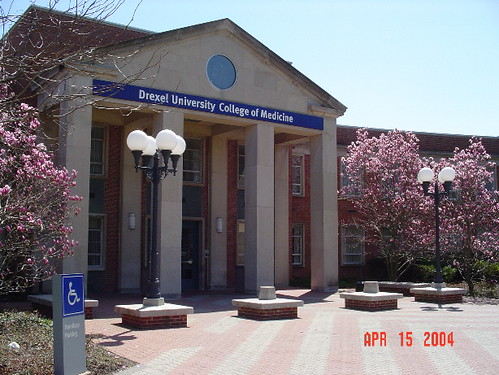:nurse:
Drexel University College of Medicine is the medical school of Drexel University. The medical school has the nation's largest enrollment for a private medical school, and represents the consolidation of two medical schools: the nation's first medical school for women and the first U.S. college of homeopathy. The College is currently housed at two locations in Philadelphia, Pennsylvania; the Queen Lane Campus and Hahnemann University Hospital, which serves as the university's Center City Hahnemann Campus.

Drexel University College of Medicine went through many name changes throughout its history. The medical school began as two separate medical schools: Hahnemann Medical College and Women's Medical College of Pennsylvania. The subsequent merger of the two schools, and with Drexel University assuming the leadership, created the College of Medicine in its present form. The US News and World Report ranks Drexel University College of Medicine 89 for overall research rank though primary care overall is not ranked.

Woman's Medical College of Pennsylvania:-
Female Medical College of Pennsylvania, 1850–1867
Woman's Medical College of Pennsylvania (WMCP), 1867–1970
Medical College of Pennsylvania (MCP), 1970–1993
When Hahnemann Medical College left its original site, the building on 229 Arch Street became the home of the Female (later, Woman’s) Medical College of Pennsylvania. In 1850, the world's first medical school for women was founded in Philadelphia. Founded by Quaker businessmen, clergy and physicians and operated by philanthropist William J. Mullen, “Woman’s Med” was the first medical school in the world to provide medical education exclusively for women. In its early days, it faced serious opposition from the male medical establishment. Prevailing notions held women too feeble-minded to succeed in the demanding arena of academic medicine and too delicate to endure the physical requirements of clinical practice. As a result, Ann Preston, M.D., a member of the College’s first graduating class, founded the Woman’s Hospital of Philadelphia. In 1866, she became dean, the first woman ever to hold that position at a medical school.
MCP Hahnemann University:-
MCP Hahnemann School of Medicine, 1993–1996
Allegheny University of the Health Sciences, 1996–1998
MCP Hahnemann University School of Medicine, 1998–2002
The Medical College of Pennsylvania merged with Hahnemann University in 1993, creating four fully accredited schools: the School of Medicine, Graduate School, School of Allied Health Professions and the School of Continuing Education. In 1993, the College became the first medical school in the country to completely integrate women's health issues into its curriculum instead of an occasional lecture or optional elective.Also in that year, MCP and Hahnemann University became part of Allegheny Health Education and Research Foundation (AHERF) and were integrated into the Allegheny University of the Health Sciences (AUHS), which included facilities in Pittsburgh, Pennsylvania. But five years later, AHERF, which owned eight Philadelphia hospitals, collapsed in the nation’s largest bankruptcy of a non-profit health care organization.
In October 1998, in an historic reorganization, the AHERF hospitals were sold to Tenet Healthcare Corporation, a for-profit hospital corporation based in Texas. A new non-profit corporation, Philadelphia Health & Education Corporation (PHEC), was created to carry on the education, research and service missions under the name MCP Hahnemann University. Drexel University was hired as the university’s operator, to bring the same level of expertise to running this academic medical center that Tenet brought to hospital management operations.
On August 3, 2000, former President Gerald Ford was admitted to the Hospital after suffering two minor strokes while attending the 2000 Republican National Convention, but made a quick recovery afterwards.

Drexel University College of Medicine:-
Drexel University College of Medicine. 2002–present
After successfully operating MCP Hahnemann University for three and one-half years, the Drexel Board of Trustees unanimously agreed to make its relationship with MCP Hahnemann permanent. On July 1, 2002, two of the MCP Hahnemann schools – the College of Nursing and Health Professions, and the School of Public Health – formally became part of Drexel, and PHEC continued to operate as a legal affiliate of Drexel under its new name, Drexel University College of Medicine. Shortly thereafter, the Secretary of Education for the Commonwealth of Pennsylvania approved the transfer to Drexel University of all degree-granting authority that had previously been vested in MCP Hahnemann. As a result, all students of the former MCP Hahnemann University are Drexel students and graduate with Drexel degrees.
Today, as Drexel University College of Medicine, the institution continues its historic commitment to women's health education. The College also now has over 1,000 medical students, more than 500 biomedical graduate students, 550 residents, 600 clinical and basic science faculty, and over 1,700 affiliate and volunteer faculty.






 Guests: 3751
Guests: 3751